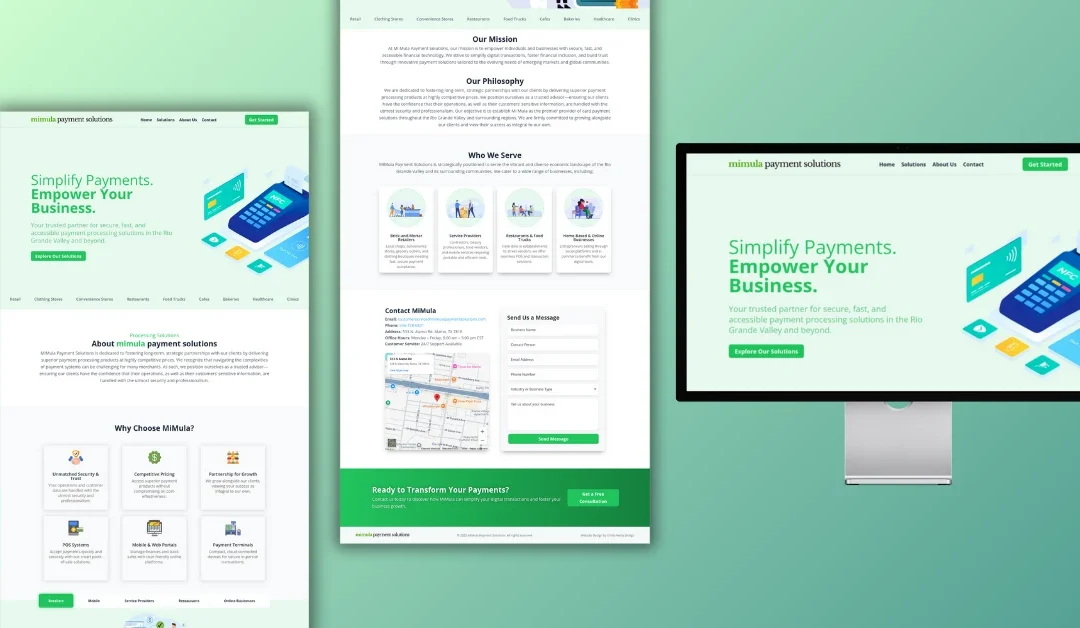So, you run a business. You’re not quite ready for the NASDAQ, but you’re doing just fine.
How should you host your website? Well, it depends.
Whether you’re redesigning your online presence or putting together a website for the first time, you want to find a hosting plan that will match your ambitions.
One of the key decisions is choosing between shared and virtual private server (VPS) hosting.
VPS Hosting
A Virtual Private Server (VPS) is a virtual platform that stores data. Many web hosts offer VPS hosting plans, which give site owners a dedicated, private space on a shared server.
Read More
Neither option is inherently better than the other. It all depends on your unique requirements. Maybe you need super-tight security, lightning-fast speed, or scalable resources? Perhaps you’re just dreaming of a low price point?
We’ve put together this helpful guide to help you make sense of this decision.
In this post, we’ll explain VPS and shared hosting and their main differences. Then, we’ll show you how to make the right choice for your small business website.
Let’s get started!
With shared hosting, your website shares the same physical server with many other sites.
It’s kind of like an apartment building: you get one unit in a larger structure. You each get an individual living space, but you share communal resources like a courtyard, garden, or pool with your neighbors.
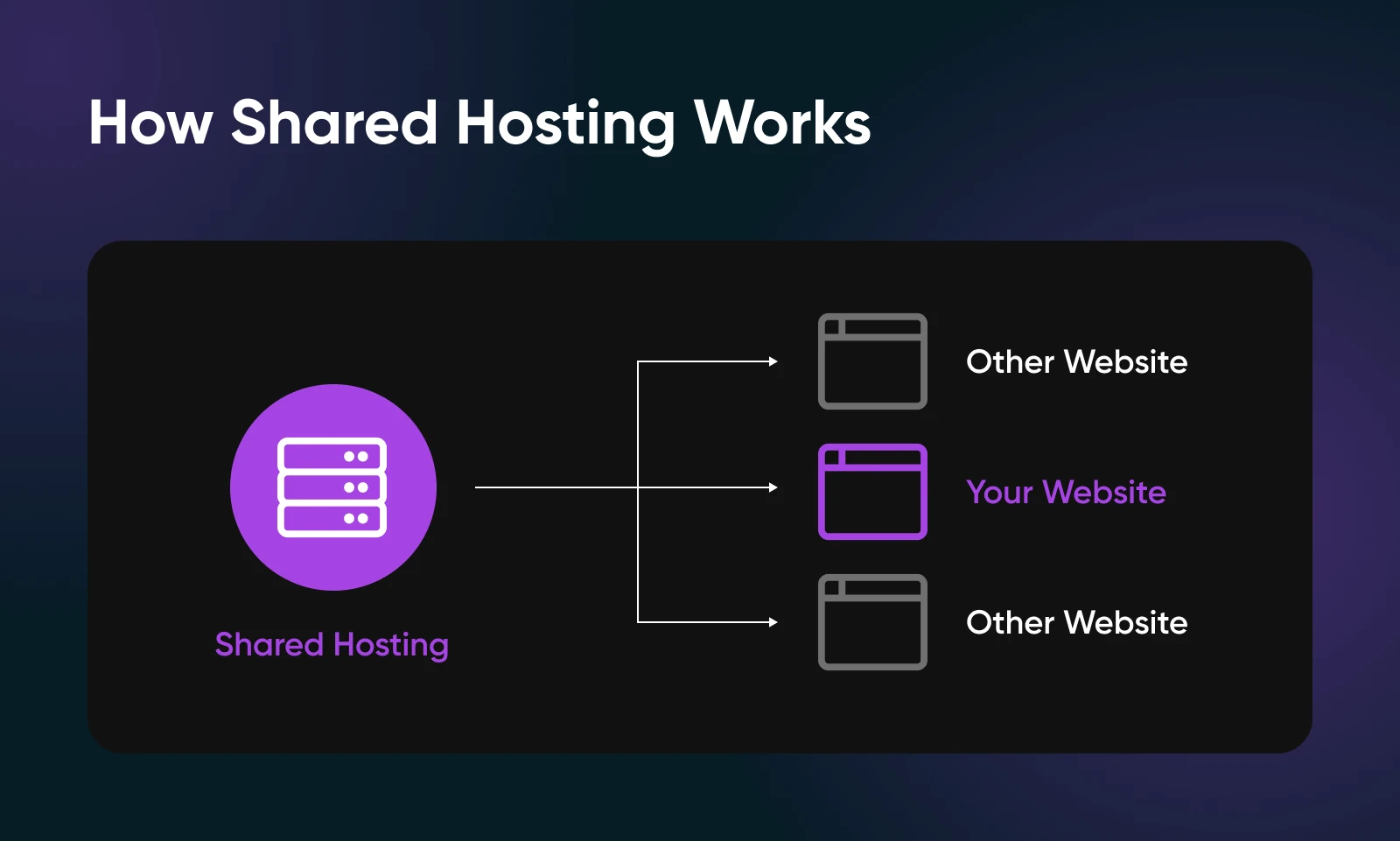
In the case of hosting, those communal resources are storage space, bandwidth, server maintenance, and more.
There is no reason to be concerned, though. No one using the server can see what others have on it. With a shared hosting plan, you simply share some physical resources with other users.
This option tends to be the cheapest because providers can serve many customers from one machine. Shared hosting usually comes with less bandwidth, management flexibility, and performance, but your host takes care of the technical configurations, maintenance, and security.
What Is VPS Hosting?
A step up from shared servers is virtual private server (VPS) hosting, which offers more room to grow and fewer restrictions.
This version of online real estate is similar to living in a condo. You still share the physical server with a few others, but resources are partitioned off and dedicated to each user.
When you own a condo, you can make changes to your living area, such as knocking down a wall. Similarly, virtual private servers allow you to modify the server to your liking. The level of customization lies somewhere between a shared plan and a dedicated server.
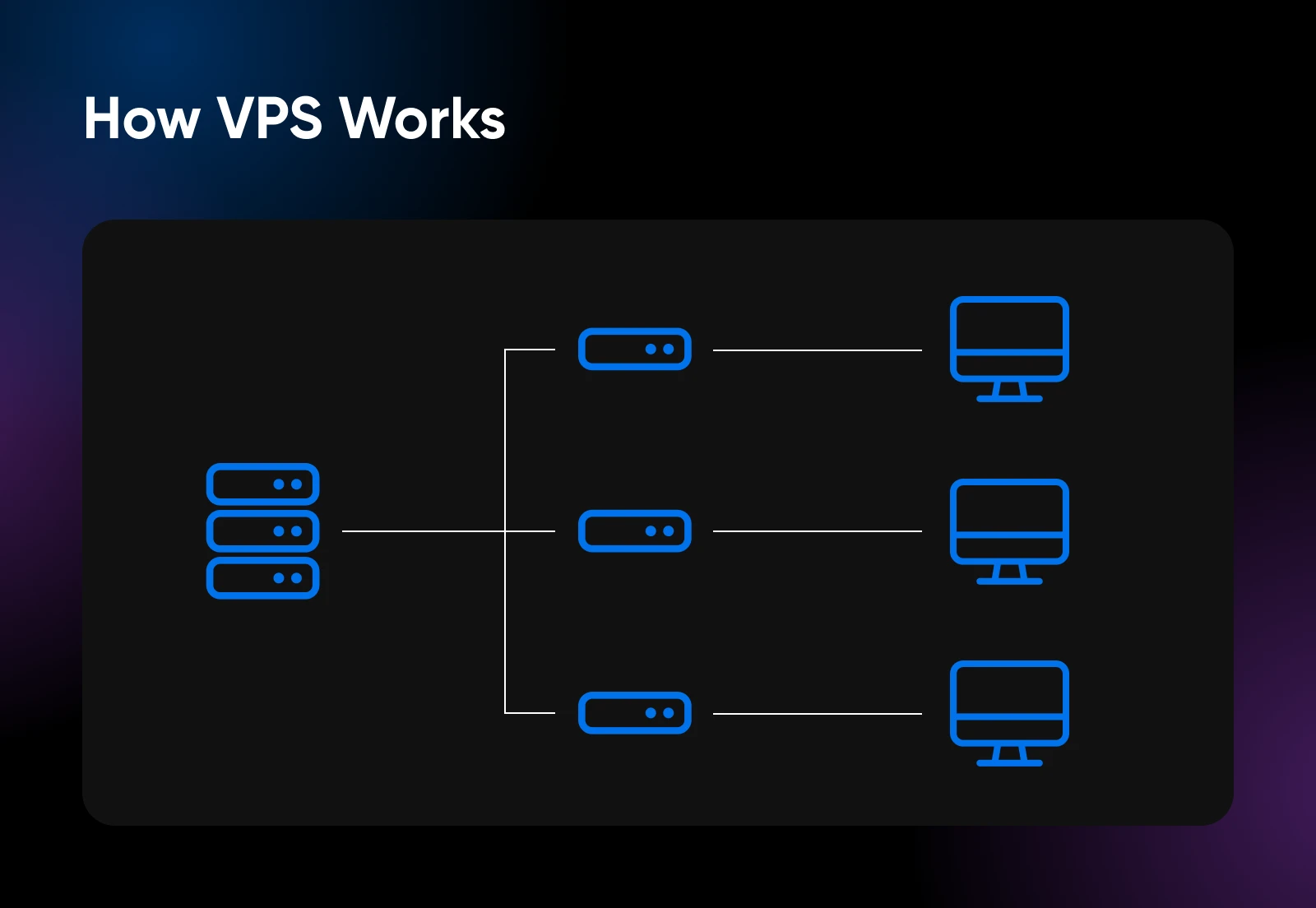
Since you don’t have to compete for computing power with VPS hosting, you don’t have to worry about other websites using up too much bandwidth or storage and slowing down your site.
If your website deals with secured data or resource-heavy applications, VPS hosting may be the way to go. These plans are typically more costly than shared hosting but still quite reasonable.
Let’s dive a little deeper so that you can see how different these options are. Here are seven key areas that separate shared hosting and virtual private server hosting:
1. Performance
Even if you’re only running a one-page website for a small business, performance really matters.
On average, sites that load in one second have a 2.5x higher conversion rate than sites that load in five seconds. That means if your website buffers for a longer amount of time, users are more likely to take their business elsewhere.
While design plays a part, the performance of your website is dictated by the type of web hosting you choose.
A VPS hosting plan is almost always faster than a shared hosting plan, simply because your users don’t have to queue up with other sites’ visitors to access yours.
To illustrate the difference, imagine a carnival with different food vendors. If everyone had to stand in the same line to get to the vendors, the wait would be longer than if each food stand had its own line.
To put it simply:
- If your site is relatively small, a good shared hosting plan will likely do perfectly fine.
- If your site is larger or necessary for business growth, consider VPS hosting.
VPS hosting offers more computing resources and processing power, which can boost the speed of most sites and, thus, increase conversions. Several VPS reviews emphasize performance and reliability when comparing DreamHost with our competitors.
2. Reliability and Stability
When we talk about the availability of a web host, we’re not checking its calendar or relationship status. No, we’re thinking about how often you can expect your website to work properly.
That includes any loading issues caused by:
- Server maintenance
- Server overload
- Cybersecurity attacks
- Hardware failure (i.e., servers breaking down)
- Bad server updates
- And more
Host reliability is directly correlated to the uptime — that is, how often your hosting server is up and running. Uptime is listed as a percentage. Generally, anything 99.9% and above is considered excellent.
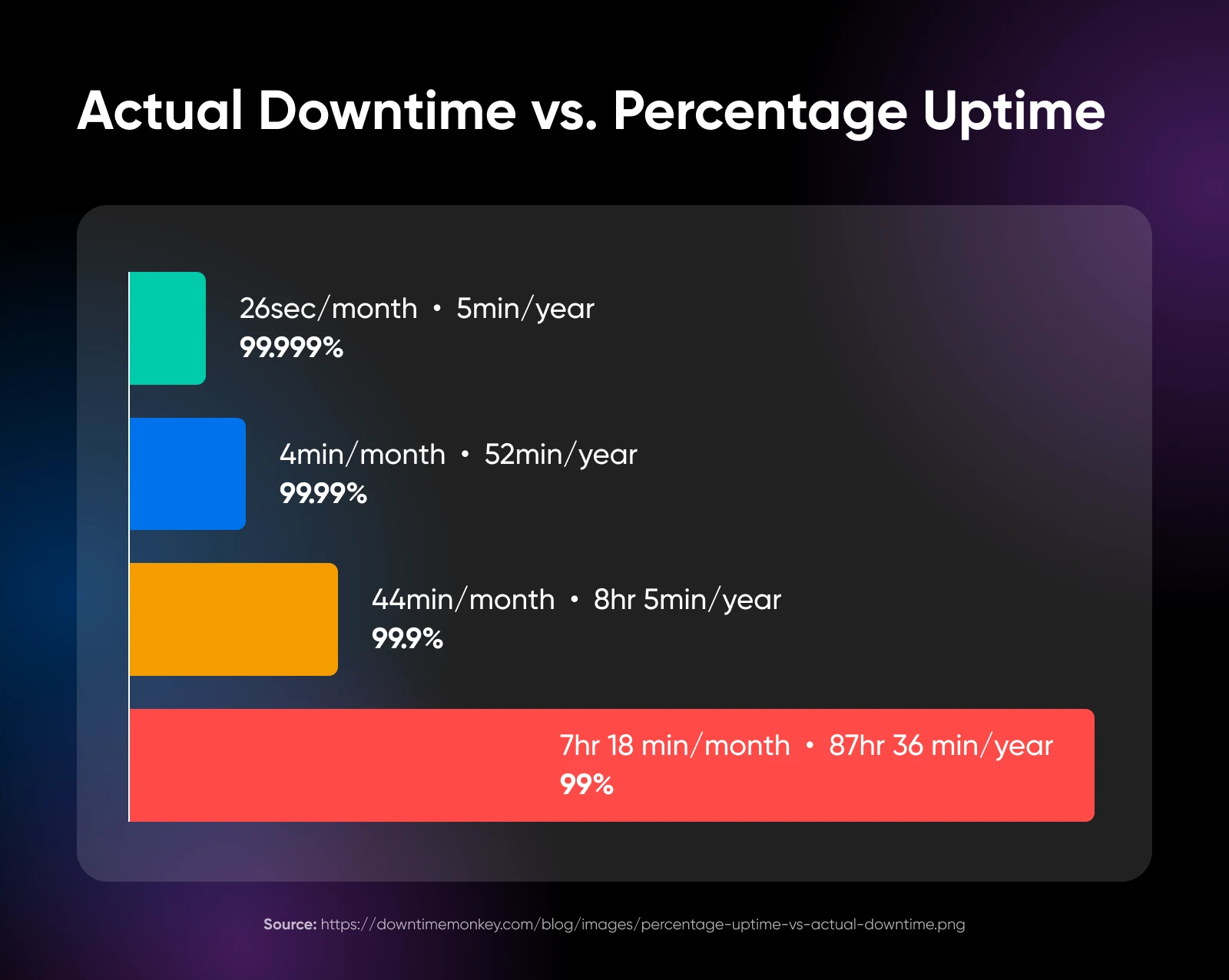
Uptime is important for any website because it determines whether your online presence will be available whenever visitors want to look around.
This can be especially crucial for professional portfolios, business sites, and e-commerce stores.
Reliability problems can arise on both shared and VPS hosting plans. Much of this depends on the quality of the server hardware and software, as well as the provider’s expertise, support, and management practices.
In a shared hosting environment, many websites besides your own could overload the server. In contrast, a VPS resides in an independent hosting environment, so other accounts won’t affect access to your site.
VPS plans also allow you to configure and customize your partition to match the requirements of your particular website or application. This extra attention means each VPS is typically more secure and stable compared to shared hosting.
DreamHost is one of a select few providers that delivers a 100% uptime guarantee, meaning our data centers have a reliable, modern, and redundant infrastructure.
Data Centers
A data center houses computer systems and telecom equipment like servers and routers. It stores and manages large amounts of data for businesses, governments, and hosting companies.
Read More
In the rare case that your website experiences unexpected downtime, DreamHost will credit your account.
3. Security
In a shared hosting environment, there is typically a higher risk of security breaches. More sites on your server mean more opportunities for attackers to gain entry.
Shared hosting customers usually have the least experience with web hosting precautions, so your hosting neighbors could cause server vulnerabilities. When one customer sharing the server forgets to update WordPress or has a compromised page, it can impact other sites on the same machine.
Just like performance and reliability, however, the risks can vary significantly based on how much the hosting company has invested in the security of its servers.
For example, DreamHost offers Let’s Encrypt SSL/TLS certificates on all the domains we host. This means that data passed through each site is always safely encrypted.
If your website handles user data or payment information, you may benefit from choosing a VPS plan.
This hosting type offers robust security features that are usually managed by seasoned professionals. That means you have less to worry about when it comes to securing sensitive information.
At DreamHost, we have a world-class security engineering team, lovingly known internally as Nightmare Labs. Their work helps keep websites running smoothly without breaches.
4. Price
With shared hosting, many users share the cost of running the server. For this reason, you can generally expect these plans to be more affordable. A VPS plan provides more resources and tends to be more reliable, so it often costs more.
Therefore, shared hosting is typically the most economical option. At DreamHost, shared hosting plans start at $2.59 per month.
VPS hosting plans offer more premium features like increased performance and customizations for online businesses. The VPS hosting plans at DreamHost start at $10 per month, offering a range of varying storage and RAM allocations.
5. Managed Services
So far, we’ve discussed what shared servers and virtual private servers are, but we’ve yet to look at who does the managing.
In most cases, shared web hosting servers are managed. This means the hosting provider’s experts ensure the servers are updated and secured.
Shared hosting technicians can also assist with tasks like migrations, backups, monitoring, updates, and maintenance. This is useful if you’re not confident with the technical side of hosting your site.
A VPS can be managed or unmanaged, the latter being where the hosting provider only assists with problems with its server or network. For example, the customer is responsible for installing and maintaining software and configurations.
When selecting a VPS hosting service, you can expect more features and support with a managed plan. To decide between a managed and unmanaged VPS, you’ll need to evaluate how much time you want to invest in maintaining the reliability and performance of your site (and your technical ability to do so).
6. Scalability
Scalability is how well your hosting plan will accommodate the growth of your website. This is often the make-or-break feature when deciding between shared or VPS hosting. There are several aspects to scalability, including storage and server capabilities.
A shared hosting plan is well suited for low-to-medium traffic websites, particularly if the visits are spread out over the month. This will suit most small businesses that maintain a website for information and marketing.
If your site grows, or your traffic tends to arrive in large bursts, a shared server may be unable to keep up with the increased workload. A VPS hosting account provides more guaranteed headroom with resources dedicated to your site.
Server resources can often be adjusted to adapt to various traffic trends. For instance, e-commerce stores may need more bandwidth to handle the rush of shoppers on Black Friday.
If you expect to add a lot more content and traffic, a VPS hosting plan is typically a good investment.
Some website owners initially opt for an affordable shared hosting plan. This way, they can test an idea and switch to a VPS plan later. But if you aim for rapid growth, you might want to start with a VPS host right away.
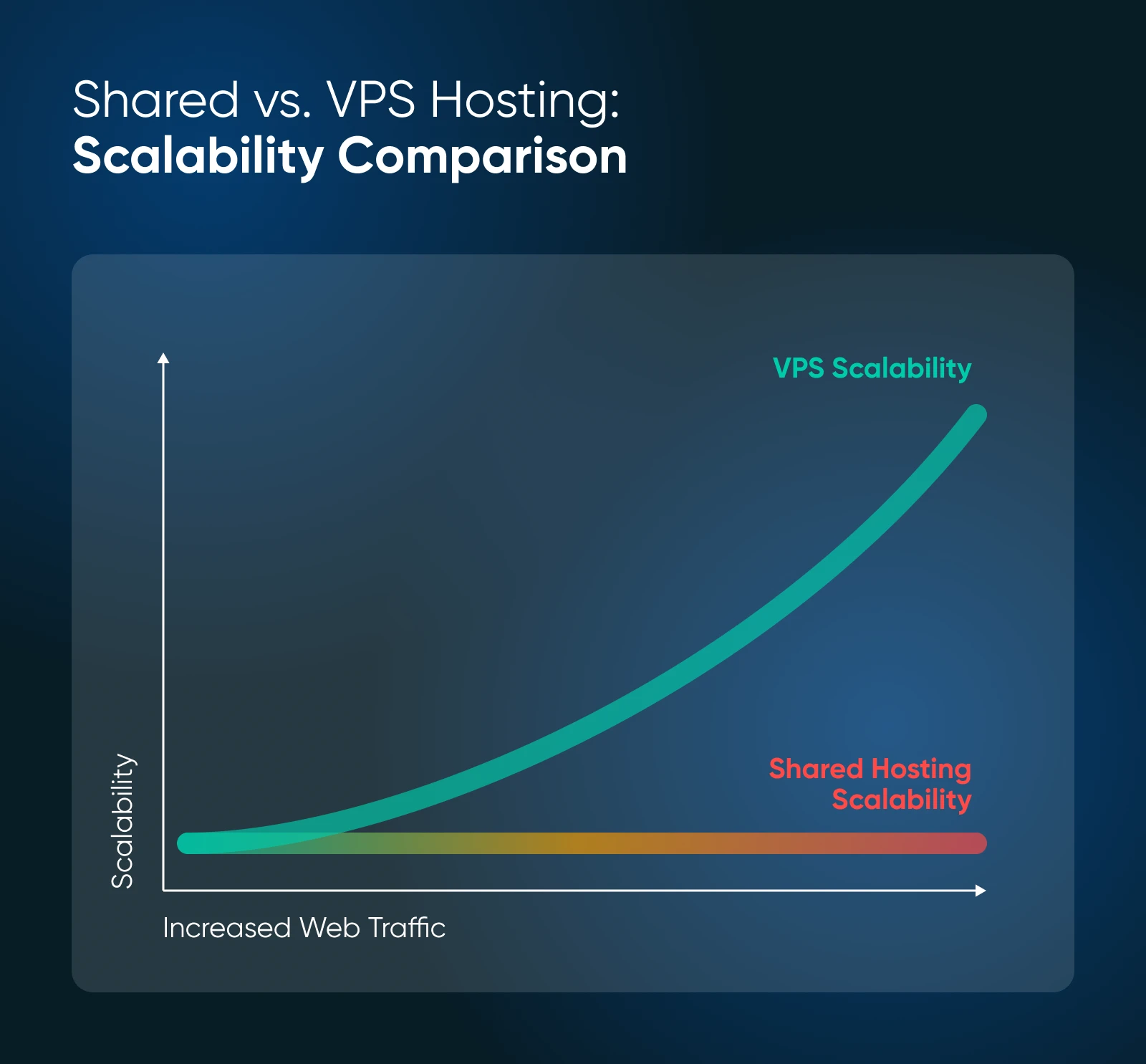
7. Customizations
On a shared hosting plan, your server will be pre-configured and optimized for the average website. If you’re a beginner, this is fine. You may not want to modify your server environment at all.
Similarly, most simple business sites can work perfectly well with this type of web hosting plan.
But what if you want to run custom software or optimize your hosting to squeeze better performance out of your website? Well, you might need a VPS plan.
With a virtual private server, you generally have fewer restrictions on customizing and installing applications on the server.
Just remember, with great power comes great responsibility. With access to the server’s software and settings, you don’t want to delete the wrong file or misconfigure a critical component by mistake.
If you’re new to web development, you may want to start with a shared hosting plan until you learn the ins and outs.
Oof, that was a lot to digest.
As you can see, shared hosting and VPS hosting are very different animals. The trick is to figure out which option best fits your needs.
Let’s quickly remind ourselves of the main differences:
| Feature | Shared Hosting | VPS Hosting |
| Performance | ? Reliable and efficient for most websites | ? Faster than a caffeinated cheetah |
| Reliability | ?️ Stable platform for small to medium sites | ?️ Rock-solid foundation for growing businesses |
| Security | ?️ Essential protection for personal and small business sites | ? Advanced security features for data-sensitive operations |
| Price | ? Budget-friendly option to get your site up and running | ? Premium features at a great value for serious projects |
| Managed Services | ?? Hassle-free management for busy site owners | ?️ Flexible options from fully managed to DIY control |
| Scalability | ? Perfect for startups and small businesses | ? Room to grow as your online presence expands |
| Customization | ? Easy-to-use, pre-configured environment | ? Tailored solutions for unique business needs |
In short, VPS hosting is great when your site is going through rapid growth and expansion, as it can keep up with your success.
Meanwhile, shared hosting is a terrific entry point into web hosting, allowing you to enjoy affordable hosting as your business develops.
Still not sure which to go for? Let’s apply what we’ve learned to the real world.
With shared hosting, you won’t have to worry about upgrades and maintenance. Shared hosting can be a great choice if you have minimal traffic or just want hosting that’s easy to maintain. This type of plan is great for:
- Blogs and personal websites
- Small to midsize companies
- E-commerce sites expecting up to 500 visitors per day
- New startups
When To Choose VPS Hosting
Since you’re in full control of your VPS, you can configure it any way you please. You will also enjoy loads of bandwidth and storage, with easy backups and strong scalability. Plus, you don’t have to worry so much about other sites on your server.
A virtual private server would be the right choice for:
- Businesses expanding rapidly beyond shared hosting
- Companies expecting a substantial increase in traffic in a few short months
- Organizations planning to host numerous websites
- High-traffic websites needing extraordinary bandwidth and security
Take Charge With Flexible VPS Hosting
Here’s how DreamHost’s VPS offering stands apart: 24/7 customer support, an intuitive panel, scalable RAM, unlimited bandwidth, unlimited hosting domains, and SSD storage.
Choose Your VPS Plan
If you already use a shared hosting plan, you might wonder if it’s time to move on to VPS hosting. Fortunately, it’s fairly easy to spot when your site is ready for the upgrade.
It’s probably time to get serious about switching when:
- Your website receives a large number of daily visits (for example, enough to slow down its average load time).
- You need additional resource allocation like RAM, CPU, disk space, or bandwidth.
- Your website takes longer than three seconds to load.
- You see lots of unexpected downtime.
We also recommend thinking about scalability. If you plan to host multiple websites for your businesses, you can upgrade to a VPS to accommodate this development.
In general, think about what your website currently needs, and what you might want for future growth.
Choose the Right Hosting Plan
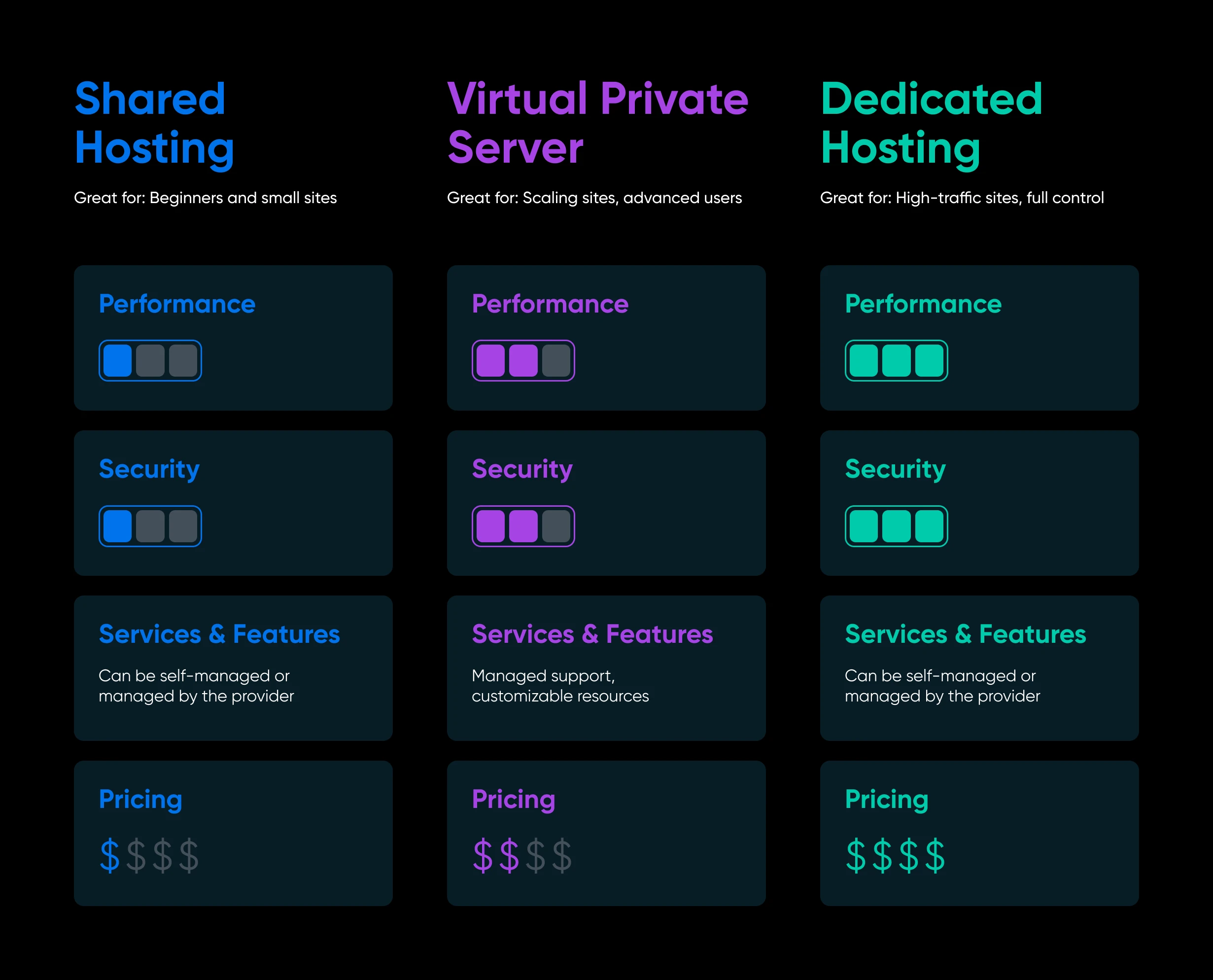
There’s really no “one size fits all” solution when it comes to web hosting. The best option for your website is the one that matches your needs.
If that means affordable and simple, using shared hosting may be the way to go. Meanwhile, VPS hosting provides a long list of features that can benefit popular and complex websites.
Whichever path you decide to take, it’s important to work with a rock-solid provider.
At DreamHost, we offer both shared hosting and VPS plans with strong uptime, good security, and generous resources. Plus, our team of hosting experts is available 24/7 to provide support.
Sign up today to try it for yourself!
VPS Hosting
Take Charge with Flexible VPS Hosting
Here’s how DreamHost’s VPS offering stands apart: 24/7 customer support, an intuitive panel, scalable RAM, unlimited bandwidth, unlimited hosting domains, and SSD storage.
Choose Your VPS Plan
Did you enjoy this article?








